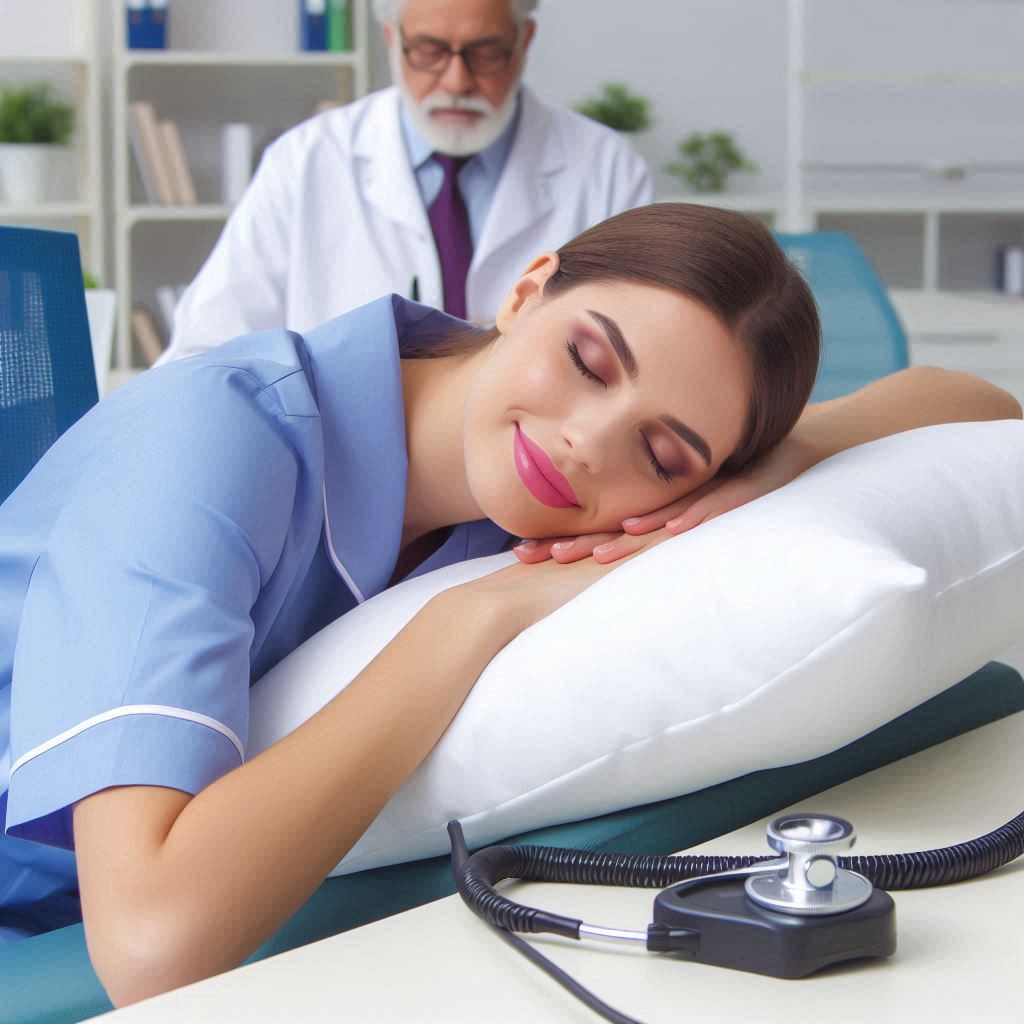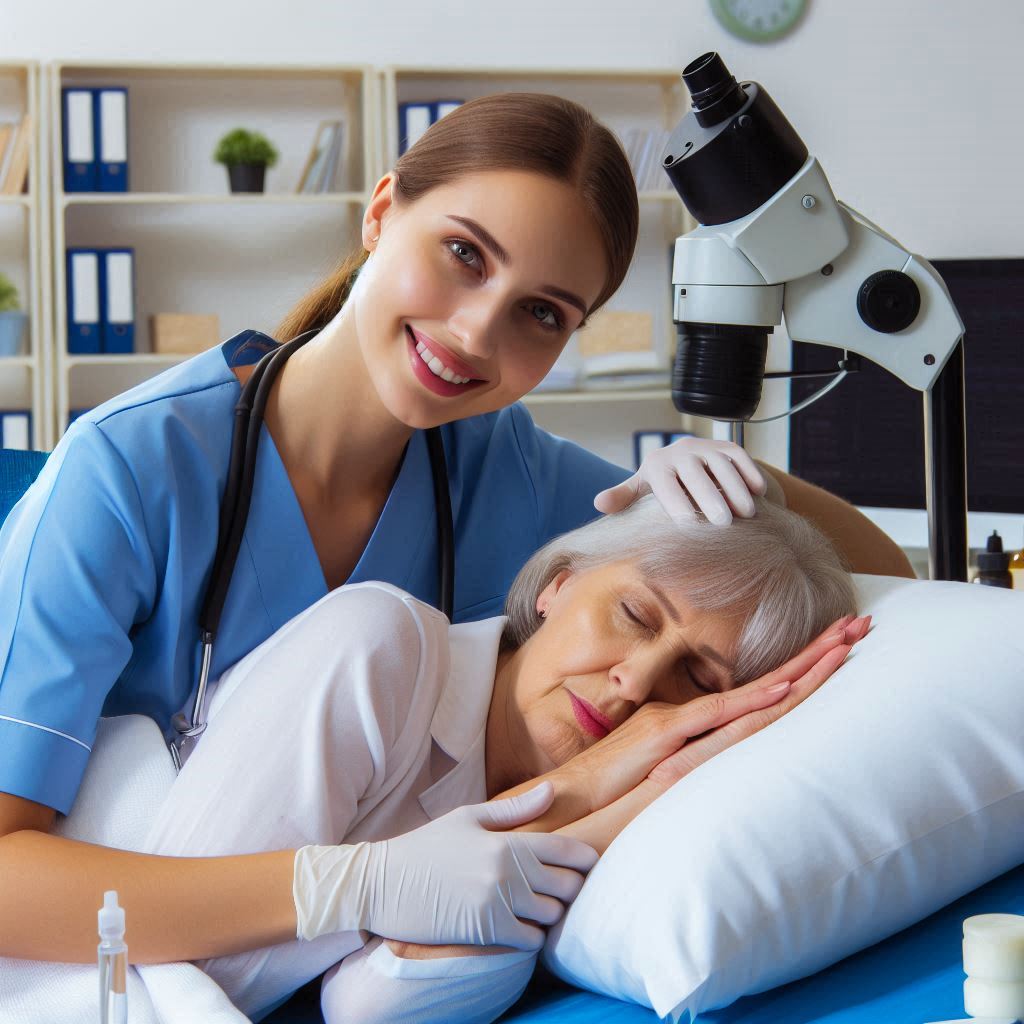Introduction
In the realm of healthcare, sleep technologists are essential professionals dedicated to diagnosing and treating sleep disorders.
They operate within specialized facilities known as sleep labs or polysomnography labs.
What is a Sleep Lab?
A sleep lab serves as a specialized facility equipped with advanced technology for conducting sleep studies.
These studies involve overnight monitoring of patients to assess various physiological parameters during sleep.
The Role of a Sleep Technologist
The primary responsibility of a sleep technologist is to administer and monitor sleep studies.
Using polysomnography equipment, they record and analyze data such as brain waves, heart rate, and breathing patterns.
Their role extends to ensuring patient comfort throughout the study and interpreting data to aid in diagnosing sleep disorders.
This profession requires technical expertise in operating monitoring equipment and analyzing sleep data.
Sleep technologists collaborate closely with sleep specialists and healthcare teams to provide accurate diagnostic insights and contribute to effective treatment plans.
Job Stability
Rising Demand for Sleep Technologists
The field of sleep technology is experiencing increasing demand, driven by several factors.
Firstly, there is a growing awareness of the importance of sleep in overall health, leading more individuals to seek diagnosis and treatment for sleep disorders.
As a result, healthcare facilities, including hospitals, sleep clinics, and specialized centers, are expanding their sleep medicine departments and increasing their need for qualified sleep technologists.
Career Growth Opportunities
For individuals entering the field, there are abundant opportunities for career growth and advancement.
Starting as a certified sleep technologist (such as an RPSGT or CPSGT), professionals can gain experience and expertise in conducting and interpreting sleep studies.
With additional training and education, they may advance into roles such as:
- Lead Technologist: Overseeing sleep study operations and ensuring quality standards.
- Clinical Supervisor: Managing a team of sleep technologists and coordinating patient care.
- Educator or Trainer: Teaching aspiring sleep technologists in educational settings.
- Researcher: Contributing to studies and advancements in sleep medicine research.
These roles not only offer increased responsibilities but also higher earning potential and professional recognition within the healthcare community.
Stable Job Market
The job market for sleep technologists is characterized by stability and resilience.
As healthcare continues to prioritize preventative care and chronic disease management, the role of sleep technologists in diagnosing and treating sleep disorders becomes indispensable.
This stability is further supported by ongoing advancements in technology and treatment modalities, which continuously expand the scope of practice and career opportunities in sleep medicine.
In general, pursuing a career as a sleep technologist promises job stability due to rising demand, ample opportunities for career growth, and a stable job market within the healthcare industry.
As the importance of sleep health gains recognition, sleep technologists remain crucial in improving patient outcomes and contributing to the broader field of sleep medicine.
Read: Benefits of Genetic Counseling for Families
Promotes Better Sleep Habits
Exposure to Information and Resources on Sleep Hygiene
As a sleep technologist, individuals gain comprehensive knowledge about sleep hygiene a set of practices and habits that promote healthy and restful sleep.
This includes understanding factors such as:
- Sleep Environment: Educating patients on creating a conducive sleep environment by managing light, noise, and temperature levels.
- Sleep Schedule: Advising on the importance of maintaining a consistent sleep schedule, including bedtime and wake-up times.
- Pre-Sleep Routine: Recommending relaxation techniques and activities that can help prepare the mind and body for sleep.
By applying these principles themselves and sharing them with patients, sleep technologists foster better sleep habits that contribute to improved overall health and well-being.
Understanding of Sleep Disorders and Their Management
In-depth knowledge of various sleep disorders equips sleep technologists with insights into their causes, symptoms, and treatment options.
This includes conditions such as:
- Obstructive Sleep Apnea (OSA): Recognizing symptoms like snoring and pauses in breathing during sleep, and understanding treatment options like Continuous Positive Airway Pressure (CPAP) therapy.
- Insomnia: Identifying factors contributing to difficulty falling asleep or staying asleep, and suggesting behavioral interventions or medications.
- Narcolepsy and Parasomnias: Differentiating between disorders characterized by excessive daytime sleepiness and unusual behaviors during sleep, and assisting in their diagnosis and management.
By addressing these disorders early and effectively, sleep technologists play a crucial role in helping patients achieve better sleep quality and overall health outcomes.
Ability to Educate Others on the Importance of Good Sleep Habits
One of the key responsibilities of a sleep technologist is patient education.
They not only explain sleep study procedures and test results but also emphasize the significance of good sleep habits for maintaining optimal health.
This educational role extends beyond individual patients to include:
- Community Outreach: Participating in public health campaigns and educational programs to raise awareness about sleep disorders and their impact on health.
- Workplace Wellness Programs: Collaborating with employers to promote healthy sleep habits among employees, thereby enhancing productivity and well-being.
By empowering individuals and communities with knowledge about sleep hygiene and disorders, sleep technologists contribute to a broader cultural shift towards prioritizing sleep as a pillar of good health.
Choosing a career as a sleep technologist deepens your understanding of sleep hygiene and disorders.
It also enables you to promote better sleep habits among patients and the community.
Sleep technologists advocate for healthy sleep practices and offer targeted interventions.
They improve sleep quality and enhance life quality for those with sleep disorders.
Read: Genetic Counseling for Inherited Disorders
Increased Awareness of Sleep Health
Understanding sleep health improves awareness of its impact on well-being.
Identify signs of sleep disorders.
Promote better sleep practices in the community.
Here’s a breakdown of each aspect:
In-depth Knowledge of the Impact of Sleep on Overall Health
- Physical Health: Understanding how sleep influences various bodily functions such as immune response, cardiovascular health, and metabolism. Poor sleep can lead to increased risks of chronic conditions like heart disease, diabetes, and obesity.
- Mental Health: Recognizing the link between sleep and mental health, including how sleep deprivation can contribute to anxiety, depression, and other mood disorders. Quality sleep is essential for cognitive functions such as memory, decision-making, and learning.
- Daily Performance: Acknowledging how sleep quality affects daily performance, including concentration, productivity, and overall energy levels.
Ability to Recognize Signs of Sleep Disorders in Patients
- Common Sleep Disorders: Familiarity with disorders such as insomnia, sleep apnea, restless legs syndrome, and narcolepsy. Each disorder has specific symptoms and can significantly impact an individual’s health and quality of life.
- Symptoms and Signs: Identifying symptoms like excessive daytime sleepiness, loud snoring, frequent awakenings during the night, and prolonged time to fall asleep. Understanding patient-reported issues such as feeling unrefreshed after sleep or having difficulty maintaining sleep.
- Assessment Tools: Utilizing tools like sleep questionnaires, sleep diaries, and, when necessary, referring patients for polysomnography (sleep studies) to diagnose sleep disorders accurately.
Advocacy for Better Sleep Health in the Community
- Education and Awareness Campaigns: Leading or participating in initiatives to educate the public about the importance of sleep. This includes workshops, seminars, and social media campaigns to spread awareness about good sleep hygiene and the consequences of sleep deprivation.
- Collaborating with Healthcare Providers: Working with other healthcare professionals to integrate sleep health into routine medical care. This can involve training sessions for healthcare workers on the importance of assessing sleep health in their patients.
- Support Groups and Resources: Establishing or supporting sleep health groups where individuals can share their experiences and obtain advice. Providing resources such as informational brochures, online materials, and access to sleep health specialists.
Promoting sleep health involves not only individual education and clinical practice but also community engagement to foster an environment where healthy sleep habits are valued and supported.
Read: Genetic Testing and Counseling: An Overview
Hands-On Experience with Technology
Hands-on experience with technology in the field of sleep health is crucial for effectively diagnosing and treating sleep disorders.
Here are the key components of this experience:
Training on State-of-the-Art Sleep Monitoring Equipment
- Polysomnography (PSG): Learning to use comprehensive sleep study equipment that records brain waves, oxygen levels, heart rate, breathing, and eye and leg movements. Understanding how to set up and calibrate the equipment for accurate data collection.
- Actigraphy: Training on wearable devices that monitor sleep-wake cycles by tracking movement. These devices are useful for assessing sleep patterns over extended periods.
- Home Sleep Apnea Testing (HSAT): Gaining expertise in using portable devices that patients can use at home to diagnose sleep apnea. These devices measure airflow, breathing effort, and oxygen levels.
Experience in Conducting Sleep Studies and Analyzing Data
- Data Collection: Conducting overnight sleep studies in a lab setting, ensuring the proper attachment of sensors and monitoring patients throughout the night.
- Data Interpretation: Analyzing the data collected from sleep studies to identify patterns and abnormalities. This includes understanding sleep architecture, such as the different stages of sleep (NREM and REM) and their significance.
- Diagnosing Disorders: Using the data to diagnose various sleep disorders like insomnia, sleep apnea, restless legs syndrome, and narcolepsy. Developing skills to interpret complex data and correlate it with patient symptoms.
Opportunity to Work with Cutting-Edge Technology in a Healthcare Setting
- Integration with Electronic Health Records (EHR): Learning to integrate sleep study data with EHR systems for comprehensive patient management. This ensures seamless communication between sleep specialists and other healthcare providers.
- Telemedicine: Utilizing telehealth platforms to conduct remote consultations and follow-ups with patients. This includes training on virtual monitoring tools and conducting remote assessments.
- Advanced Therapeutic Devices: Gaining experience with the latest treatment technologies, such as CPAP (Continuous Positive Airway Pressure) machines for sleep apnea, adaptive servo-ventilation devices, and other innovative therapies.
Hands-on experience with advanced technology equips healthcare professionals with the necessary skills to diagnose and treat sleep disorders effectively.
It also enhances their ability to provide high-quality care, improving patient outcomes and advancing the field of sleep medicine.
Transform Your Career Today
Unlock a personalized career strategy that drives real results. Get tailored advice and a roadmap designed just for you.
Start NowRead: Salary and Job Outlook for Genetic Counselors

Emotional and Mental Well-being
Focusing on emotional and mental well-being in the context of sleep health involves improving individuals’ sleep quality, positively impacting their lives, and finding personal fulfillment in the process.
Here are the key aspects:
Helping Individuals Improve Their Quality of Sleep
- Personalized Sleep Plans: Developing customized sleep improvement plans based on individual needs, including sleep hygiene education, relaxation techniques, and cognitive-behavioral therapy for insomnia (CBT-I).
- Support and Guidance: Providing continuous support and guidance to help individuals implement and maintain healthy sleep habits. This can include regular check-ins, adjustments to the sleep plan, and encouragement.
- Stress Management: Teaching techniques for managing stress and anxiety, which are common barriers to good sleep. Techniques can include mindfulness, meditation, and progressive muscle relaxation.
Making a Positive Impact on Patients’ Lives
- Enhanced Daily Functioning: Helping patients achieve better sleep can lead to significant improvements in their daily functioning, including increased energy levels, better mood, and enhanced cognitive performance.
- Chronic Condition Management: Assisting patients in managing sleep disorders can also positively affect the management of chronic conditions such as diabetes, cardiovascular diseases, and mental health disorders.
- Quality of Life: Improving sleep can lead to a better overall quality of life, as adequate rest is foundational to physical health, mental well-being, and social functioning.
Personal Satisfaction from Assisting Others in Achieving Better Sleep Health
- Fulfillment in Caregiving: Deriving personal satisfaction from knowing that your efforts directly contribute to someone‘s well-being. Witnessing improvements in patients’ health and happiness can be highly rewarding.
- Professional Growth: Continuously learning and applying new techniques in sleep health can contribute to professional development and a sense of achievement.
- Building Relationships: Forming meaningful relationships with patients and their families can provide a sense of community and mutual respect, enhancing the overall caregiving experience.
By focusing on emotional and mental well-being, professionals in the sleep health field can make a profound difference in their patients’ lives while also experiencing personal and professional fulfillment.
Work-Life Balance
One of the key benefits of becoming a sleep technologist is the opportunity for a better work-life balance. Here are some reasons why:
Opportunity for Flexible Work Schedules
As a sleep technologist, you may have the option to work flexible hours.
This can be particularly valuable if you have personal commitments or prefer working at specific times of the day.
The ability to choose your own schedule can help you maintain a good work-life balance.
Ability to Work in Various Healthcare Settings
Another advantage of this profession is the ability to work in different healthcare environments, such as hospitals or sleep clinics.
This flexibility allows you to choose a setting that suits your preferences and lifestyle.
Whether you prefer a fast-paced hospital setting or a more relaxed clinic environment, there are options available to accommodate your needs.
Potential for Part-Time or Full-Time Positions
Whether you are looking for a part-time or full-time position, becoming a sleep technologist offers flexibility in terms of working hours.
This flexibility allows you to tailor your work schedule to fit your personal life commitments.
You can choose the number of hours you work per week, making it easier to achieve a work-life balance that works for you.
In fact, the health benefits of becoming a sleep technologist extend beyond the physical well-being of patients.
The career offers opportunities for personal growth, professional development, and a better work-life balance.
Gain More Insights: Key Trends in the Registered Dietitian Profession
Networking and Collaboration
As a sleep technologist, one of the significant benefits you will experience is the opportunity to network and collaborate with a variety of healthcare professionals.
This aspect of the job not only enhances your skill set but also opens up doors for professional growth and development.
Working closely with healthcare professionals in multidisciplinary teams
In the field of sleep technology, you will often find yourself working alongside professionals from various disciplines such as neurology, pulmonology, psychology, and cardiology.
This multidisciplinary approach allows for a comprehensive evaluation of patients with sleep disorders, ensuring that each individual receives tailored treatment and care.
Collaborating with physicians, nurses, and other specialists
Sleep technologists play a crucial role in supporting the work of physicians, nurses, and other healthcare specialists involved in the diagnosis and treatment of sleep disorders.
By collaborating closely with these professionals, you can contribute valuable insights and observations that help inform patient care and treatment plans.
Building professional relationships and expanding professional network in the healthcare industry
Networking is an essential aspect of any healthcare profession, and as a sleep technologist, you will have the opportunity to connect with a wide range of professionals within the industry.
Building strong relationships with peers, mentors, and leaders in the field can not only enhance your knowledge and skills but also open up avenues for career advancement and collaboration on research projects or initiatives.
In a nutshell, networking and collaboration are key benefits of becoming a sleep technologist.
Work closely with healthcare professionals in multidisciplinary teams.
Collaborate with physicians, nurses, and other specialists.
Build professional relationships in the healthcare industry.
Enrich your professional experience.
Contribute to advancing patient care in sleep medicine.
Conclusion
Becoming a sleep technologist can have numerous health benefits.
It allows for a structured schedule that promotes better sleep patterns.
Additionally, the job requires constant physical activity, which can lead to increased fitness levels.
By monitoring and diagnosing sleep disorders, sleep technologists play a vital role in improving patients’ quality of life.
This sense of purpose can boost mental well-being and satisfaction with one’s career choice.
For individuals considering a career in sleep technology, it is essential to recognize the positive impact it can have on both personal health and the well-being of others.
Embrace the opportunity to make a meaningful difference in people’s lives through better sleep health.
Furthermore, the field of sleep technology is growing rapidly, with a rising demand for qualified professionals.
By pursuing a career in this field, individuals can contribute to advancing healthcare practices and addressing the critical issue of sleep health.
In closing, prioritizing sleep health is crucial for overall well-being, as adequate rest is essential for physical, mental, and emotional health.
As a sleep technologist, you can actively participate in promoting better sleep habits and improving the quality of life for individuals experiencing sleep-related issues.
[E-Books for Sale]
The Big Book of 500 High-Paying Jobs in America: Unlock Your Earning Potential
$19.99 • 500 High-Paying Jobs • 330 pages
Explore 500 high-paying jobs in America and learn how to boost your career, earn more, and achieve success!
See All 500 High-Paying Jobs of this E-Book
1001 Professions Without a Degree: High-Paying American Jobs You Can Start Now
$19.99 • 1001 Professions Without a Degree • 174 pages
Discover 1001 high-paying jobs without a degree! Unlock career tips, skills, and success strategies for just $19.99!




